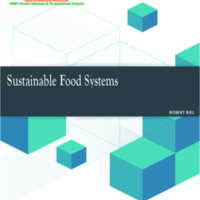Sustainable Food Systems
Dublin Core
Title
Subject
Description
This book places itself within the traditions and the ongoing activity of UCL’s Bartlett Development Planning Unit, and within its research cluster, Environmental
Justice, Urbanisation & Resilience. It draws heavily upon my teaching for the Environment and Sustainable Development Masters. I owe an immense debt to all my fellow Development Planning Unit (DPU) staff, as
well as past and present students, from whom I have
learned much. In particular I am happy to acknowledge
the contribution of Yves Cabannes: together we created
a Masters module on Urban Agriculture, and explored
the framework for a radical redefinition of the topic.
My colleagues Zeremariam Fre and Michel Pimbert
also played important roles in the module’s subsequent
development and influenced my thinking in several
ways. At the same time, I approach this topic as a food- growing practitioner and allotmentholder: the allotment movement and its working-class traditions of self- organisation continue to inspire me. This is a book about how people can feed themselves into the future, and also about major aspects of climate adaptation/ mitigation.
I sought to approach these extremely serious topics in a spirit of responsibility. The United Nations Food and
Agriculture Organisation (FAO) has proposed the need
for a ‘new paradigm’ premised on ‘sustainable intensification’ andI felt it was essential to engage with
this constructively rather than merely critiquing
its ‘discourse’. A core concern of DPU is to address environmental crisis through the lens of the interests of working and oppressed peoples; on this basis, we always seek win- win solutions to ecological- social problems. While such solutions are concrete, and thus specific to each case, they also suggest more general conceptual
insights, which can in turn serve to guide new projects.
Justice, Urbanisation & Resilience. It draws heavily upon my teaching for the Environment and Sustainable Development Masters. I owe an immense debt to all my fellow Development Planning Unit (DPU) staff, as
well as past and present students, from whom I have
learned much. In particular I am happy to acknowledge
the contribution of Yves Cabannes: together we created
a Masters module on Urban Agriculture, and explored
the framework for a radical redefinition of the topic.
My colleagues Zeremariam Fre and Michel Pimbert
also played important roles in the module’s subsequent
development and influenced my thinking in several
ways. At the same time, I approach this topic as a food- growing practitioner and allotmentholder: the allotment movement and its working-class traditions of self- organisation continue to inspire me. This is a book about how people can feed themselves into the future, and also about major aspects of climate adaptation/ mitigation.
I sought to approach these extremely serious topics in a spirit of responsibility. The United Nations Food and
Agriculture Organisation (FAO) has proposed the need
for a ‘new paradigm’ premised on ‘sustainable intensification’ andI felt it was essential to engage with
this constructively rather than merely critiquing
its ‘discourse’. A core concern of DPU is to address environmental crisis through the lens of the interests of working and oppressed peoples; on this basis, we always seek win- win solutions to ecological- social problems. While such solutions are concrete, and thus specific to each case, they also suggest more general conceptual
insights, which can in turn serve to guide new projects.
Creator
Publisher
Contributor
Cut Rita Zahara
Rights
Craetive Commons
Type
Files
Collection
Citation
Robert Biel, “Sustainable Food Systems,” Open Educational Resources (OER) , accessed January 29, 2026, https://oer.uinsyahada.ac.id/items/show/325.


